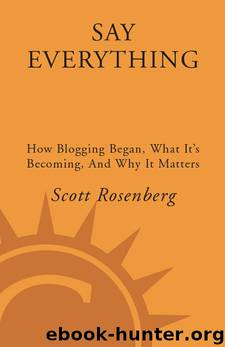Say Everything by Scott Rosenberg

Author:Scott Rosenberg [Rosenberg, Scott]
Language: eng
Format: epub
ISBN: 978-0-307-45138-5
Publisher: Crown Publishing Group
Published: 2009-06-12T16:00:00+00:00
By late 2002 Boing Boing was humming on all outboard-brain cylinders. It embraced novelty and cherished weirdness, yet resisted becoming parochial or obscure. However fringy its content, its authors—all of whom earned a living (or some of it) as freelance writers—offered clean design, clear writing, and concise headlines. Doctorow later attributed the blog’s success in part to this commitment to directness: “Every link one follows from Boing Boing, one follows to find out not *what* is at the other end, but more *about* what is at the other end.” (This was the exact opposite of the old Suck.com style of linking, where the link often worked obliquely or sarcastically in relation to the text.) Visitors were rewarded with an endless stream of loopy tidbits, linked only by the range of the contributors’ interests. Here’s a rant about a music piracy lawsuit! Here’s a report on the elections in Serbia! Here’s a hot-dog roaster designed to look like Cthulhu, H. P. Lovecraft’s indescribable monstrosity! Here’s a link to a story about people who pull out their own teeth! And every time we show you something truly gross like that, we’ll follow it with a psychic palate cleanser—here’s some kitschy unicorn art!
The formula worked, and the editors kept refining it, finding new ways to expand the site’s reach. Within a couple of years they had won the heart of a certain portion of the Web: Boing Boing was geek central, only without the programming tips. And its editors came to embody a certain type of hip integrity. The music world had a label, “indie cred,” for the sense of authenticity you got from a band that had won success independent of a major label contract; on the Web, Boing Boing’s bloggers were indie cred personified.
The editors said that Boing Boing was something they did in their spare time, and that was true. Yet that didn’t mean they lacked ambition. They wanted to see Boing Boing succeed, to reach more readers with their posts; but they didn’t seek readers by the traditional route. Conventional editors started out with an idea of a target audience and strove to assemble content that would appeal to its profile. Boing Boing’s editors were more like the curators of a 24/7 exhibit of the “wonderful things”—or weird, or outrageous, or funny things—that had caught their fancy. Then they watched, delighted, as the first trickle of visitors brought their friends, who brought more, until the place was packed.
It was not an approach that anyone schooled in the media mainstream would have chosen. But it beautifully suited the blog format. In the sprawling new blog universe, Boing Boing found itself propelled by links and growth—and oodles of whuffie—to a position of central influence.
Download
This site does not store any files on its server. We only index and link to content provided by other sites. Please contact the content providers to delete copyright contents if any and email us, we'll remove relevant links or contents immediately.
Kotlin in Action by Dmitry Jemerov(18475)
Grails in Action by Glen Smith Peter Ledbrook(16202)
Sass and Compass in Action by Wynn Netherland Nathan Weizenbaum Chris Eppstein Brandon Mathis(13873)
Configuring Windows Server Hybrid Advanced Services Exam Ref AZ-801 by Chris Gill(7510)
Azure Containers Explained by Wesley Haakman & Richard Hooper(7508)
Running Windows Containers on AWS by Marcio Morales(7057)
Microsoft 365 Identity and Services Exam Guide MS-100 by Aaron Guilmette(5444)
Microsoft Cybersecurity Architect Exam Ref SC-100 by Dwayne Natwick(5282)
Combating Crime on the Dark Web by Nearchos Nearchou(5029)
The Ruby Workshop by Akshat Paul Peter Philips Dániel Szabó and Cheyne Wallace(4711)
Management Strategies for the Cloud Revolution: How Cloud Computing Is Transforming Business and Why You Can't Afford to Be Left Behind by Charles Babcock(4558)
Python for Security and Networking - Third Edition by José Manuel Ortega(4284)
The Age of Surveillance Capitalism by Shoshana Zuboff(4264)
Learn Wireshark by Lisa Bock(4183)
Learn Windows PowerShell in a Month of Lunches by Don Jones(4132)
The Ultimate Docker Container Book by Schenker Gabriel N.;(3930)
Ember.js in Action by Joachim Haagen Skeie(3907)
DevSecOps in Practice with VMware Tanzu by Parth Pandit & Robert Hardt(3617)
Windows Ransomware Detection and Protection by Marius Sandbu(3588)
